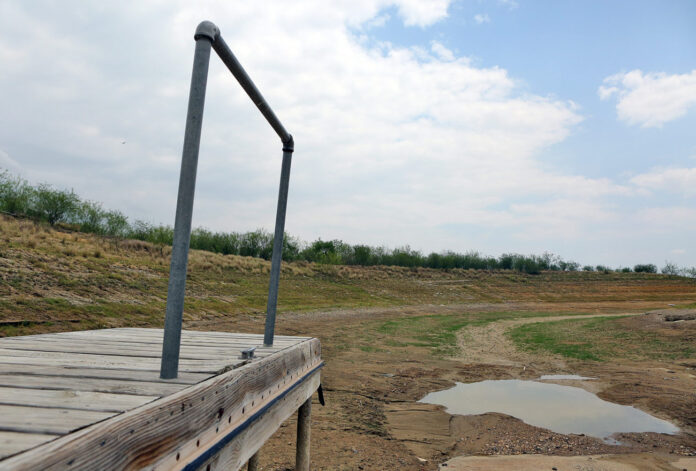

Water levels at the Falcon Reservoir have steadily declined over the last year, dropping by 20% since May 2019.
As of Wednesday, water conservation storage was 25.9% of the reservoir’s conservation capacity, according to data from the Texas Water Development Board, down from 46% on May 6, 2019.
Though not a historic low, the International Boundary and Water Commission stated there is concern when “the overall trend of reservoir deviates from the conservation level, which is when the reservoir is full.”
“Presently, management officials in both the United States and Mexico are closely monitoring the lake level information along with other hydrological data throughout the Rio Grande watershed,” the IBWC said in an email.
The reservoir is managed by the governments of the U.S. and Mexico through IBWC for the purposes of water conservation, flood control, hydroelectric energy and recreation, according to the Texas Water Development Board.
While the effects of low water levels on the agriculture community are unclear, the IBWC said they had been informed that some irrigation districts in the Rio Grande Valley have low water balances and may deplete their irrigation water unless conditions improve.
“Should this occur, it could also be a hardship on municipal water suppliers whose water supply is conveyed through the irrigation canals ‘piggy backed’ on the irrigation water,” they stated.
While weather conditions can be attributed for the declining levels, the lack of water inflow from Mexico’s streams into the Rio Grande are also a cause.
Through the 1944 water treaty between the U.S. and Mexico, the two countries agreed on how waters from the Rio Grande and the Colorado and Tijuana rivers would be utilized.
Mexico agreed to deliver water into the Rio Grande while the U.S. agreed to deliver water from the Colorado River.

However, Mexico is behind in its “deliveries” and must deliver more than 450,000 acre-feet to the U.S. by Oct. 24 to be in compliance, according to the IBWC.
The shortage of water deliveries from Mexico was an issue raised by state Rep. Eddie Lucio III, D-Brownsville, whose office issued a news release Wednesday stating he and state Rep. Lyle Larson, R-San Antonio, were calling on the federal government to hold Mexico accountable.
Their statement claimed water suppliers in the Valley were at risk of running out of water by June because of Mexico’s failure to deliver water as required by the treaty.
Specifically, Irrigation District No. 9, which supplies water to Weslaco, Mercedes, Elsa, Edcouch and La Villa through the North Alamo Water supply Corporation, is currently at 38% capacity, according to the statement.
“Irrigation districts and municipal water suppliers rely on Mexico releasing water from tributaries of the Rio Grande that originate on its side of the border into Lake Falcon and Lake Amistad for use by the United States farmers, residents, and businesses,” the news release stated.
It further claimed that the North Alamo Water Supply Corporation, which supplies potable water for areas in Hidalgo, Cameron and Willacy counties, is currently looking for emergency water supplies to make up for the shortage of water deliveries from Mexico, adding that the cost of any emergency water supplies would be passed onto the ratepayers.
“The government in Mexico is making political decisions that have severe economic consequences for our region,” Lucio stated. “It is unconscionable that the federal government allows abuses by Mexico to occur decade after decade at the expense of residents and growers in the Rio Grande Valley. My constituents are subsidizing the agriculture economy on the other side of the border.”
Larson, who chairs the House Natural Resources Committee which oversees water issues, called on the federal government to withhold water if Mexico did not hold up their end of the agreement.
“Mexico must know that water release will not be made from the Colorado River if they do not make releases into the Rio Grande,” Larson stated. “There must be a change in policy at the federal level to look at the treaty holistically and enforce consequences if either country is non-compliant.”



